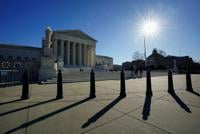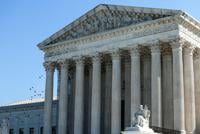Arguments are scheduled this week in federal court in a lawsuit challenging New Hampshire’s “banned concepts” law, which critics contend has muzzled classroom dialogue about racism and sexism.
The arguments are scheduled to be heard at 10 a.m. Tuesday at U.S. District Court in Concord.
The court will hear a motion for summary judgment. The ACLU of New Hampshire will argue on behalf of two New Hamp
shire school administrators who specialize in diversity, equity and inclusion, as well as the National Education Association — New Hampshire (NEA-NH).
The plaintiffs are represented by lawyers from a broad coalition of organizations and law firms, including the NEA-NH and National Education Association, the ACLU, the ACLU of New Hampshire, Disability Rights Center — New Hampshire, GLBTQ Legal Advocates & Defenders, Nixon Peabody LLP, Preti Flaherty, and Shaheen & Gordon, P.A.
AFT-New Hampshire will also be arguing in this case against the so-called “banned concepts” law.
The plaintiffs argue the law is unconstitutionally vague under the 14th Amendment and violates the First Amendment, discouraging public school teachers from teaching and talking about race, gender, disability, and LGBTQ+ identities inside and outside the classroom.
“This unconstitutionally vague law disallows students from receiving the inclusive, complete education they deserve,” said Gilles Bissonnette, legal director of the ACLU of New Hampshire. “New Hampshire’s classroom censorship law is an attack on educators who are simply doing their job, and through vagueness and fear it erases the legacy of discrimination and lived experiences of Black and Brown people, women and girls, LGBTQ+ people, and people with disabilities.”
Last year, U.S. District Court Judge Paul Barbadoro denied the state’s motion to dismiss the litigation, making it the fourth legal challenge to a “banned concepts” law in the U.S. to reach a similar point. Laws banning similar concepts in other contexts in Florida were preliminarily enjoined on vagueness grounds in two cases, which followed another federal judge deeming former President Trump’s Executive Order on “divisive concepts” impermissibly vague.
In that January 2023 ruling, Barbadoro concluded that the law does “not give teachers fair notice of what they can and cannot teach,” adding that given “the severe consequences that teachers face if they are found to have taught or advocated a banned concept, plaintiffs have pleaded a plausible claim that the amendments are unconstitutionally vague.”
Barbadoro’s ruling meant the consolidated case, consisting of two lawsuits challenging the state’s divisive concepts law, could proceed toward a trial. One of the suits was filed by educators Andres Mejia and Tina Kim Philibotte and the National Education Association–New Hampshire, and the other was filed by American Federation of Teachers.
The two lawsuits were consolidated into a single case in March 2022.
The Republican-led Legislature attached what it called a Right to Freedom from Discrimination and Public Workplaces and Education to the two-year state budget trailer bill that Gov. Chris Sununu signed last June.
It bans teaching in elementary and high schools that any individual, by virtue of his or her race and sex, is “inherently racist” or the teaching that one race or sex is “inherently superior” to another.
Supporters maintain the aim is to prevent the teaching of discrimination. They also said it doesn’t ban discussing “as part of a larger course of academic instruction, the historical existence of ideas and subjects” such as racism in public schools.
Philibotte, the chief equity officer for the Manchester School District, and Mejia, the Exeter Region Cooperative School District director of diversity, equity, inclusion and justice, argue that the vague law is unconstitutionally chills educators’ voices and prevents students from having an open and complete dialogue about the perspectives of historically marginalized communities.
“We have dedicated our careers to creating an education community where every student —including Black, Brown, and students of color, students from the LGBTQAI+ community, students with disabilities, and students from other historically marginalized identities — feel like they belong,” said Philibotte and Mejia in a joint statement.
“This law chills the very type of diversity, equity, and inclusion work that is absolutely necessary to ensure that each student is seen, heard, and connected, especially as New Hampshire becomes more diverse. We are relieved that the court recognized that this should proceed, and we will continue to challenge this law.”

















